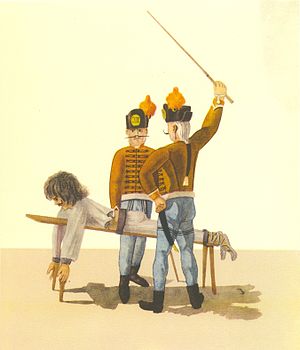Romania: Difference between revisions
No edit summary |
m (Text replacement - "__TOC__" to "") |
||
| Line 23: | Line 23: | ||
Romania is a developing country with a high-income economy, recognized as a middle power in international affairs. It hosts several UNESCO World Heritage Sites and is a growing tourist attraction, receiving 13 million foreign visitors in 2023. Its economy ranks among the fastest-growing in the European Union, primarily driven by the service sector. Romania is a net exporter of cars and electric energy worldwide, and its citizens benefit from some of the fastest internet speeds globally. | Romania is a developing country with a high-income economy, recognized as a middle power in international affairs. It hosts several UNESCO World Heritage Sites and is a growing tourist attraction, receiving 13 million foreign visitors in 2023. Its economy ranks among the fastest-growing in the European Union, primarily driven by the service sector. Romania is a net exporter of cars and electric energy worldwide, and its citizens benefit from some of the fastest internet speeds globally. | ||
== Spanking in Romania == | == Spanking in Romania == | ||
Revision as of 14:52, 13 October 2024
| Romania |
|
(and Romania's largest city) |
Source information is available at [ Sources ] |
Romania is a country located at the crossroads of Central, Eastern, and Southeast Europe. It borders Ukraine to the north and east, Hungary to the west, Serbia to the southwest, Bulgaria to the south, Moldova to the east, and the Black Sea to the southeast. It has a mainly continental climate and an area of 238,397 km2 (92,046 sq mi) with a population of 19 million people (2023). Romania is the twelfth-largest country in Europe and the sixth-most populous member state of the European Union. Its capital and largest city is Bucharest, followed by Cluj-Napoca, Iași, Timișoara, Constanța, Craiova, Brașov, and Galați. Europe's second-longest river, the Danube, empties into the Danube Delta in the southeast of the country. The Carpathian Mountains cross Romania from the north to the southwest, including Moldoveanu Peak, at an altitude of 2,544 m (8,346 ft).
Settlement in the modern-day territory of Romania began in the Lower Paleolithic, followed by written records attesting to the kingdom of Dacia, its conquest, and subsequent Romanisation by the Roman Empire during late antiquity. The modern Romanian state was formed in 1859 through a personal union of the Danubian Principalities of Moldavia and Wallachia. The new state, officially named Romania in 1866, gained independence from the Ottoman Empire in 1877. During World War I, after declaring its neutrality in 1914, Romania fought together with the Allied Powers from 1916. Bukovina, Bessarabia, Transylvania, and parts of Banat, Crișana, and Maramureș became part of the Kingdom of Romania in the aftermath of the war. In June–August 1940, due to the Molotov–Ribbentrop Pact and Second Vienna Award, Romania was compelled to cede Bessarabia and Northern Bukovina to the Soviet Union and Northern Transylvania to Hungary. In November 1940, Romania signed the Tripartite Pact and, consequently, in June 1941, entered World War II on the Axis side, fighting against the Soviet Union until August 1944, when it joined the Allies and recovered Northern Transylvania. Following the war and occupation by the Red Army, Romania became a socialist republic and a member of the Warsaw Pact. After the 1989 Revolution, Romania began transitioning towards democracy and a market economy.
Romania is a developing country with a high-income economy, recognized as a middle power in international affairs. It hosts several UNESCO World Heritage Sites and is a growing tourist attraction, receiving 13 million foreign visitors in 2023. Its economy ranks among the fastest-growing in the European Union, primarily driven by the service sector. Romania is a net exporter of cars and electric energy worldwide, and its citizens benefit from some of the fastest internet speeds globally.
Spanking in Romania
Not much is known about the practice of spanking in Romania, but it can be assumed it was once as common as everywhere in Europe. The Romanian language has no specific word for spanking. "Bătaie" means spanking, but also hitting, punching, beating or fighting.
Today, school corporal punishment is forbidden in Romania. Spanking of children in the home was illegalized in Romania in 2004.
A study by WHO from 2002 revealed that of 714 female and 581 male Romanian adolescents aged 13–14 years, 84% had experienced corporal punishment.
Orphanages
Romania has the highest number of orphaned children in Europe. There have been media reports of a high percentage of maltreatment in Romanian orphanages, including neglect, emotional, physical and sexual abuse.
A national survey of child abuse in residential care institutions in Romania revealed that 37% of children aged 7–18 years reported being victims of severe corporal punishment or beatings.
Movies
- Haiducii lui Saptecai (1970), a mainstream film that features two spanking/flagellation scenes, both more humorous than serious.
- Wilhelm Cuceritorul (1982), M/F scene; video clip
Romanian spanking sites
The Amateur Spanking Club Romania is a Romanian free site featuring spanking stories in Romanian and photos.
( We have no further information from Corpun.com as of Oct, 2024 )
Prostitution in Romania
- Prostitution in Romania ↗ on Wikipedia
External links
- More information is available at [ Wikipedia:Romania ]
Chat rooms • What links here • Copyright info • Contact information • Category:Root


